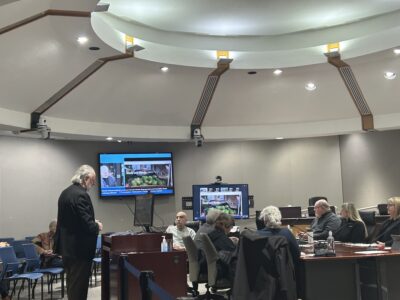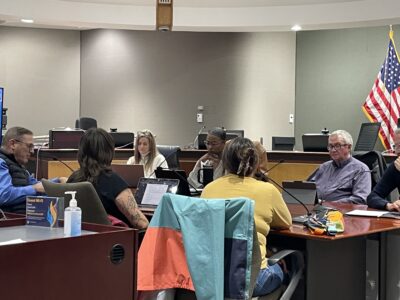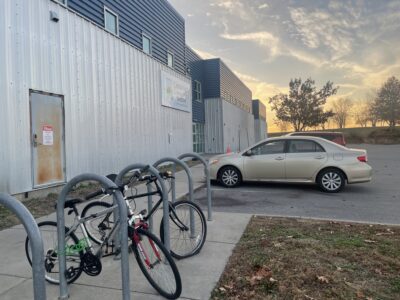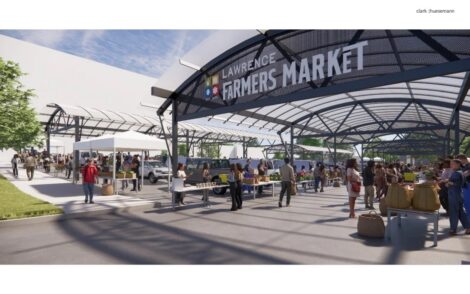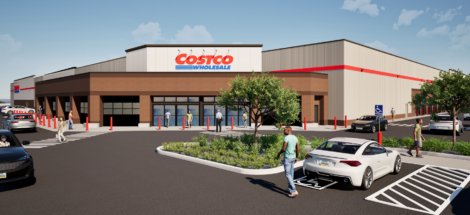Lawrence City Commission moves forward with 2023 budget that maintains property tax rate, increases utility rates

photo by: City of Lawrence
Commissioner Bart Littlejohn, Vice Mayor Lisa Larsen and Mayor Courtney Shipley discuss the city's proposed budget for 2023.
Lawrence city leaders have taken a step forward with a 2023 budget that maintains the current property tax rate, increases utility rates, creates new parks and recreation fees and provides raises for city staff.
The Lawrence City Commission held its 2023 budget hearing on Tuesday and voted 5-0 to exceed the “revenue neutral” rate, meaning commissioners decided to spend the extra money the city will collect due to property value increases as part of the proposed budget. The commission received correspondence and public comments from some residents who spoke to the financial burden of rising property tax bills, and while commissioners said the city needed to take that into account, they supported the budget as proposed because of the initiatives it funded.
Vice Mayor Lisa Larsen said though she agreed with comments that such large jumps were not sustainable, she supported the budget and its large investment in infrastructure maintenance, which she said would ultimately save the city money in the long run. But she said it was not a course the city could maintain.
“We cannot continue to do this at this large of a jump like this,” Larsen said. “We need to be really cautious going forward in the future.”
In supporting the budget as proposed, other commissioners also emphasized the need to continue addressing deferred maintenance of city infrastructure, as well as providing pay raises to city staff and maintaining the current level of city services.
The proposed budget for 2023 totals $439.6 million in spending across all funds and keeps the city’s property tax rate flat at 33.29 mills. The city’s property tax collections will go up $5.4 million due to increased property values. To be revenue neutral, or to collect the same amount in taxes as last year, the city would need to reduce its mill levy rate to 29.075 mills.
The budget also proposes $1.2 million in new parks and recreation fees, utility rate increases, and about $5 million for employee raises. The $5 million would fund a 2.25% increase to the primary pay plan and the pay schedules agreed upon as part of the contracts for unionized employee groups.
The residents who provided comments to the commission spoke to the financial strain placed on them by increasing property tax payments, or increased rent passed on by landlords, especially at a time when other costs are also going up.
“You talk about affordable housing; you’re making housing unaffordable for everyone,” said retired Lawrence resident Dan Cady.
In the last year, residential property values in Lawrence have increased by 15.6%, according to the Douglas County Appraiser’s Office. That means even with a flat tax rate, homeowners will still pay significantly more in taxes. For example, if the owner of a house valued at $250,000 sees a 15.6% increase in value, to $289,000, the amount owed to the city would increase by $149, from $957 to $1,106, just due to the increase in value.
The city previously proposed increasing water and sewer rates by 8.75% in 2023, 10.5% in 2024, and 12% in 2025. If approved, the bill of a typical utility customer using 4,000 gallons of water a month would increase from $115 to $145, or a 26% increase over the three-year period. Commissioners recently asked the city to look for reductions in spending to decrease those increases, and indicated they were not interested in funding phase two of a project to improve water taste and odor at the Clinton Water Treatment Plant that would have cost $8.15 million. Finance Director Jeremy Willmoth said the changes requested had been made, and that the revised rates would be brought back to the commission for adoption in the fall.
City staff sought the commission’s direction on a few policy questions, including whether the city should decrease its mill levy rate to offset the .077 mill increase approved by the Lawrence Public Library board to help fund library staff raises. That increase is projected to generate $99,000 in 2023. There was some disagreement regarding whether the city should decrease its rate to offset the library increase, so that the city’s overall tax rate remained flat. Larsen and Commissioner Bart Littlejohn were in favor of not decreasing the city’s rate to offset the library increase, with Larsen arguing that the city shouldn’t be taking on the cost to fund library salaries.
City staff also wanted to know if commissioners would like to see any changes to the budget or the Capital Improvement Plan. The recommended budget includes about $110.88 million in capital projects for 2023 and $446.33 million over the five-year Capital Improvement Plan. The 2023 CIP is adopted as part of the budget, while the remaining years are used as a planning document for utility fees and other expenditures. The commission did not call for changing the funding level.
The recommended budget was amended since it was originally presented. Initially it included a proposal to close the Prairie Park Nature Center building and transfer those employees to other positions within the city, which would have saved the city $337,000. Dozens of people spoke out against the closure, and some commissioners expressed interest in looking at alternative cuts. Commissioners also expressed interest in looking at alternatives to a proposed $100,000 reduction to contracted animal control services provided by the Lawrence Humane Society.
The budget presented Tuesday keeps the nature center open, but recommends the Parks and Recreation department work with community members to identify ways to reduce the subsidy of the program, which is currently 85%, and recover more of the center’s operating costs. The budget also calls for reducing the Lawrence Humane Society contract by $35,000 instead of $100,000. Commissioners heard comments from several people expressing concern about how the funding decrease would affect shelter operations, and the commission ultimately directed staff to completely restore the funding by using federal pandemic aid to cover the difference.
The feedback provided by the commission will be used to draft the budget resolution, which the commission will consider adopting at its meeting on Sept. 6.



